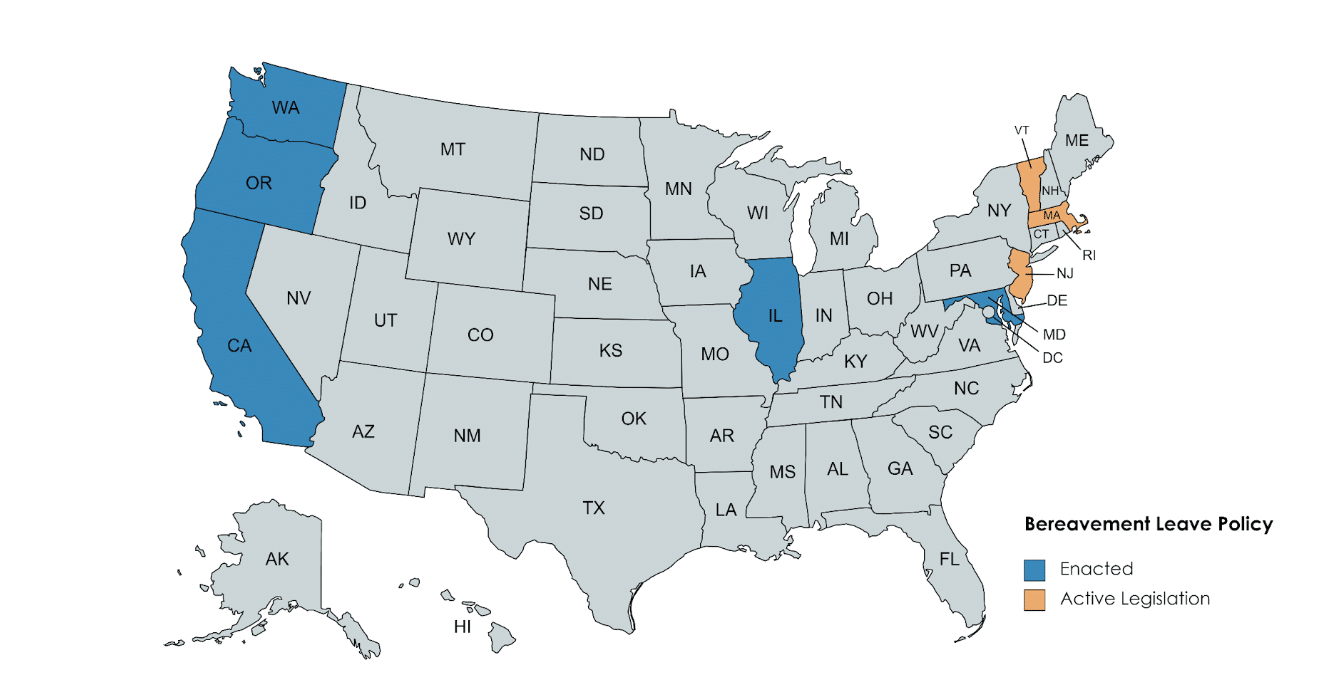Employers
How much leave to offer and whom to offer it to remains a policy gap. Employees who need time away from work to grieve and to cope with the death of a loved one have no legal right to take leave, with narrow exceptions in California, Illinois, Maryland, Oregon, and Washington. Bereavement is not an acceptable use of unpaid leave under the Family and Medical Leave Act, despite recent efforts to add it to the law.
Many employers offer bereavement leave; however, the leave is often only a few days, which is not sufficient for most employees coping with a death. Bereavement can have broad and long-lasting effects on an employee’s health and well-being, with substantial impacts on productivity at work. Allowing employees adequate time to grieve their loss has benefits for both the employee and the employer. Bereavement policies can be structured in a variety of ways, and the size of an organization is likely to impact the type of policy that can be implemented.
State Bereavement Leave Laws and Legislation in 2023
The unexpected or untimely death of a loved one is the most common traumatic event Americans experience, with many bereaved individuals reporting it as the worst event of their life. Employees who need time off from work to grieve and cope with the death of a loved one currently have no legal right under federal law to take leave. As the Family and Medical Leave Act stands, bereavement is not an acceptable condition for taking unpaid leave from work. In 2023, five states have bereavement leave laws, and three states have active legislative efforts.
Read the full issue brief on state bereavement leave laws and legislation here!
**Hover over the states to learn more about specific state laws and legislation related to bereavement leave.

MASSACHUSETTS
Two separate pieces of legislation related to providing bereavement leave for employees are currently filed for introduction in the Massachusetts state legislature. Senate Draft 2340, sponsored by Senator Michael Barret (D), and House Draft 2207, sponsored by Representative Sean Garballey (D), look to add bereavement leave to existing Massachusetts FMLA laws, while House Draft 274, sponsored by Christopher Worrell (D) and Senate Draft 1072 sponsored by Liz Miranda (D) would require employers who employ more than 10 employees to provide up to 10 days of unpaid bereavement leave.
Senate Draft 2340 and House Draft 2207
These bills propose to add bereavement leave to existing Massachusetts Family and Medical Leave laws. The bills would provide that family leave is available to any covered individual to cope with the death of a family member by attending the funeral, making arrangements necessitated by the death, or grieving the death of a family member. Employees would be entitled to a total of 8 weeks of family leave for bereavement purposes upon the death of each family member within a benefit year. Employees would be entitled to a weekly benefit during two of the 8 weeks of leave. This leave would be permitted to be taken intermittently or on a reduced leave schedule by the employee.
House Draft 274 and Senate Draft 1072
This bill requires employers to permit employees to take bereavement leave following the death of a family member for up to 10 business days within any 12-month period to make arrangements, attend the funeral, or grieve the death of a family member. The leave would be required to be taken within 30 days of the date of the death of a family member and would not be required to be paid leave. The bill also does not require employers who employ fewer than 10 employees to implement bereavement leave policies.
NEW JERSEY
There are a handful of bills active in the New Jersey state legislature related to providing bereavement leave for employees. Most of the bills were introduced in 2022, and they all currently remain in committee.
Assembly Bill 5084
Introduced on January 19, 2023, by Representative Shanique Speight (D) expands the family leave provided under the New Jersey FMLA to cover leave to grieve the loss of a child due to the death of the child, miscarriage, stillbirth, or termination of a pregnancy for medical reasons. Leave would also be covered for employees who experience an unsuccessful adoption or unsuccessful fertility treatment.
The bill also amends the Temporary Disability Benefits Law to include disability leave benefits for the purpose of bereavement for the loss of a child. Leave would be limited to not more than 21 days immediately following the loss for a circumstance for which the employee would not be otherwise eligible and no more than seven days related to a circumstance for which the employee would be otherwise eligible for disability or family leave benefits.
Assembly Bill 4695
Speight also introduced Assembly bill 4695 on October 3, 2022. This bill expands on the provisions of 5084 above to amend FMLA laws, Temporary Disability Insurance, and also earned sick leave regulations. The bill looks to provide paid leave for covered employees who experience pregnancy loss, unsuccessful assisted reproductive technology procedures, failed adoption or surrogacy arrangement, or any other event impacting pregnancy or fertility.
The bill also permits up to three working days of bereavement leave for an employee who experiences the death of a family member or for pregnancy loss. Under the bill, employees would be permitted to use earned sick leave, family leave benefits, or temporary disability benefits and be able to choose the order in which leaves are taken. The bill would also expand coverage of the state’s FMLA laws to include employees of companies employing less than 30 employees from requiring reinstatement after leave.
Assembly Bill 4985
Introduced by Representative Sadaf Jaffer (D) on December 15, 2022, this bill proposes to amend the existing Family Leave Act to permit employees to take leave following the death of a family member or the miscarriage or stillbirth of a child. Under the bill, employees would be eligible to use their 12 weeks of family leave for bereavement purposes, but employers would be permitted to require an employee to return to work by providing a notification to the employee that they must return to work within 10 working days.
Senate Bill 2298 and Assembly Bill 3373
These bills, introduced by Senator Richard Codey (D) and Assembly Member Beth Sawyer (R) in March of 2022, provide that an employee is permitted to take family leave under New Jersey FMLA to grieve the loss of a child due to miscarriage or stillbirth. Employees would also be permitted to take family temporary disability leave under the Temporary Disability Benefits Law to bereave the loss of a child due to miscarriage or stillbirth. This would be limited to individuals who are the biological parents of a child or the domestic partner or civil union partner of the individual.
MARYLAND
In the fall of 2021, Maryland amended its existing Flexible Leave Act to permit employees to use paid leave for bereavement purposes following the death of an immediate family member. The MFLA requires employers with 15 or more employees to permit employees to use accrued paid leave for bereavement purposes.
Under the law, “immediate family member” is defined to mean a child, spouse, or parent. “Parent” includes stepparents, and “child” only includes a child who is under the age of 18 or over 18 and incapable of self-care due to a mental or physical disability.
This law is different in that it simply extends the right to use existing accrued paid leave for bereavement purposes. The law does not mandate employers to provide any specific unpaid bereavement leave; it only permits eligible employees to use accrued paid leave for bereavement of an immediate family member.
VERMONT
House bill 66 was introduced in the Vermont state legislature on January 18, 2023, by Democratic Representative Emilie Kornheiser. This bill is wide-ranging in its scope as it proposes to create a Family and Medical Leave Insurance Program and looks to provide paid leave for reasons related to domestic and sexual violence as well as bereavement. The bill defines “bereavement leave” to mean a leave of absence from employment or self-employment by an individual due to the death of the individual’s family member that occurs not more than one year after the death. This includes leave taken in relation to settling the family member’s estate. Employees would be permitted to use up to two out of the 12 weeks of available benefits for family and medical leave during the year for bereavement leave.
The bill proposes to cover any employee who has received payments from an employer for which the employer is required to withhold Vermont income tax. The paid leave program is financed by a proposed 0.58% payroll tax split between the employer and employee and a $20 million appropriation from the state.
Vermont has passed bills attempting to implement a universal paid family leave program twice in recent years. In 2020, House bill 107 made it to the governor’s desk before being vetoed, but this is the first time a proposed paid family leave bill has included bereavement leave. The governor has stated that he is strongly opposed to implementing a program that is funded through an additional payroll tax and has already rolled out a plan to implement a voluntary plan funded through a private insurer. House bill 66 has received a lot of democratic support in the Vermont legislature and currently sits in the House Committee on General and Housing.
CALIFORNIA
On September 29, 2022, California became the most recent state to enact a statewide bereavement leave policy. This new law requires employers with five or more employees to allow employees to take up to five days of bereavement leave upon the death of a family member. Unlike the laws above, the five days of bereavement leave is provided as an additional form of protected leave separate from the 12 weeks of permitted leave provided under the California Family Rights Act.
Employees are eligible if they have been employed for at least 30 days prior to the leave. Employees are not required to take the five days consecutively, but the leave must be completed within three months of the date of the death. This law also does not limit the amount of bereavement leave that can be taken in a calendar year. Instead, employees are permitted to take up to five days of bereavement leave per covered family member, including a spouse; child; parent; sibling; grandparent; grandchild; domestic partner; or parent-in-law.
The law also requires that bereavement leave is taken pursuant to an employer’s existing policies but does not require the five days of bereavement leave to be paid leave. Employees are permitted to use any accrued paid leave during the course of their bereavement leave. California’s law also does not apply to employees covered by a valid collective bargaining agreement under certain conditions.
OREGON
The Oregon Family Leave Act covers bereavement leave. Under OFLA, employers with 25 or more employees must provide bereavement leave to eligible employees. Employees are eligible if they have worked for the employer for 180 days or more and worked an average of 25 or more hours per week for the 180 days prior to the bereavement leave.
Under the law, bereavement leave is defined as leave taken to deal with the death of a family member by attending the funeral, making arrangements, or grieving. Bereavement leave is provided for up to two weeks per death and has to take place within 60 days from the death.
Employers are not required to pay employees for bereavement leave, but employees are permitted to use paid leave they have accrued for bereavement purposes, and in some cases, employers can require the employee to use their accrued paid leave.
WASHINGTON
In the summer of 2022, Washington amended its Paid Family and Medical Leave Act (PFML) to make paid leave available for bereavement under certain circumstances. Under the amendments, employees are now permitted to take paid leave during the seven days after the death of the employee’s child if they would have qualified for medical leave under the existing PFML law due to their own pregnancy or to bond with the employee’s child in the first 12 months after birth or placement. These amendments are meant to give bereavement leave to employees who are new parents and suffer the loss of a stillborn baby or child under 12 months of age. For qualifying leave taken with respect to the placement of a child, it would only apply to an employee who experienced the death of a child under the age of 18 within the first 12 months after they were placed with the employee.
ILLINOIS
In the summer of 2022, Illinois enacted the Family Bereavement Leave Act. This act replaced the existing Illinois Child Bereavement Act that went into effect in 2016. The new law extends the provisions of the Illinois Child Bereavement Act to permit bereavement leave for “covered family members.” FBLA defines “covered family member” to include children; stepchildren; father-in-law; mother-in-law; grandchildren; grandparents; parents; stepparents; domestic partner; spouse; or siblings.
The Illinois FBLA covers all employers who are covered by the federal law under FMLA. This means that all public and private employers with 50 or more employees are required to provide bereavement leave benefits to eligible employees. Employees are eligible if they have worked at least 1,250 hours of service with the employer during the prior 12-month period and work within 75 miles of at least 49 other employees.
Under FBLA, employees are entitled to use a maximum of 2 weeks (10 work days) of unpaid bereavement leave to attend the funeral of a covered family member, make arrangements, or grieve the death of a covered family member. Notably, the leave also permits the absence from work due to a miscarriage; an unsuccessful round of an assisted reproductive technology procedure; a failed adoption match; a failed surrogacy agreement; a diagnosis that negatively impacts pregnancy or fertility; or a stillbirth.

U.S. Military Servicemembers are Eligible for Bereavement Leave
In 2022, the National Defense Authorization Act directed the U.S. military to institute bereavement leave for servicemembers who experienced the death of a spouse or child.
Here are five highlights:
1) Allows for up to two weeks of paid bereavement leave for covered Service members in connection with the death of a spouse or child.
2) Formally went into effect March 29, 2023, and remains in place until March 29, 2025. It is retroactive for a member whose spouse or child died on or after June 25, 2022.
3) A member with less than 30 days of accrued ordinary leave may be authorized bereavement leave for this purpose.
4) Authority to grant bereavement leave will be extended to unit commanders. Swift and sensitive action on bereavement leave requests will be made to avoid additional stress on the member and their family.
5) Bereavement leave may be authorized in combination with chargeable leave (e.g., emergency leave, ordinary leave, and advance leave) and other types of non-chargeable leave (e.g., convalescent leave and emergency leave of absence).







